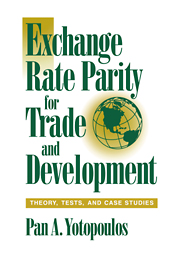Book contents
- Frontmatter
- Contents
- List of Tables and Figures
- Preface
- Part I A review of the terrain
- 1 Introduction
- 2 Trade and development: The contours of the landscape
- 3 Incomplete markets and the “new development economics”
- Part II Theory and empirical analysis
- Part III Successes and failures in development: Good/bad economics and governance
- Bibliography
- Index
1 - Introduction
Published online by Cambridge University Press: 27 October 2009
- Frontmatter
- Contents
- List of Tables and Figures
- Preface
- Part I A review of the terrain
- 1 Introduction
- 2 Trade and development: The contours of the landscape
- 3 Incomplete markets and the “new development economics”
- Part II Theory and empirical analysis
- Part III Successes and failures in development: Good/bad economics and governance
- Bibliography
- Index
Summary
For all the efforts that have gone into the economic development of less-developed countries (LDCs) in the last half-century, there have been but a half-dozen unqualified successes, almost all in East Asia. It is no wonder, therefore, that the paternity of these scarce development miracles has been vehemently contested. Free marketeers point to the reliance on private enterprise and free markets, and they emphasize the openness to trade. Statists, on the other hand, focus on the nonmarket allocation of resources and on highly distorted trade regimes. The intelligent layman, who has been caught between conflicting claims, has long suspected that the truth lies somewhere in between, and perceptive economists often have articulated that case well.
This book brings to the debate a systematic rule that helps determine the optimal mix between market and state in the process of development. The philosophical starting point is that the state need not (indeed must not) venture where the market works fairly well. In these cases, free-market, free-trade, laissez-faire capitalism will lead to Pareto-optimal outcomes. Yet, the dynamic formulation of the fundamental theorem of welfare economics just stated introduces the important exception of market incompleteness. If markets are incomplete – in space, time, or uncertainty – the free-market equilibrium generally will not be Pareto optimal. Government intervention is required, and there is no presumption that it will be successful.
The thesis of this book is that market incompleteness is systematically related to the level of underdevelopment.
- Type
- Chapter
- Information
- Exchange Rate Parity for Trade and DevelopmentTheory, Tests, and Case Studies, pp. 3 - 11Publisher: Cambridge University PressPrint publication year: 1995



